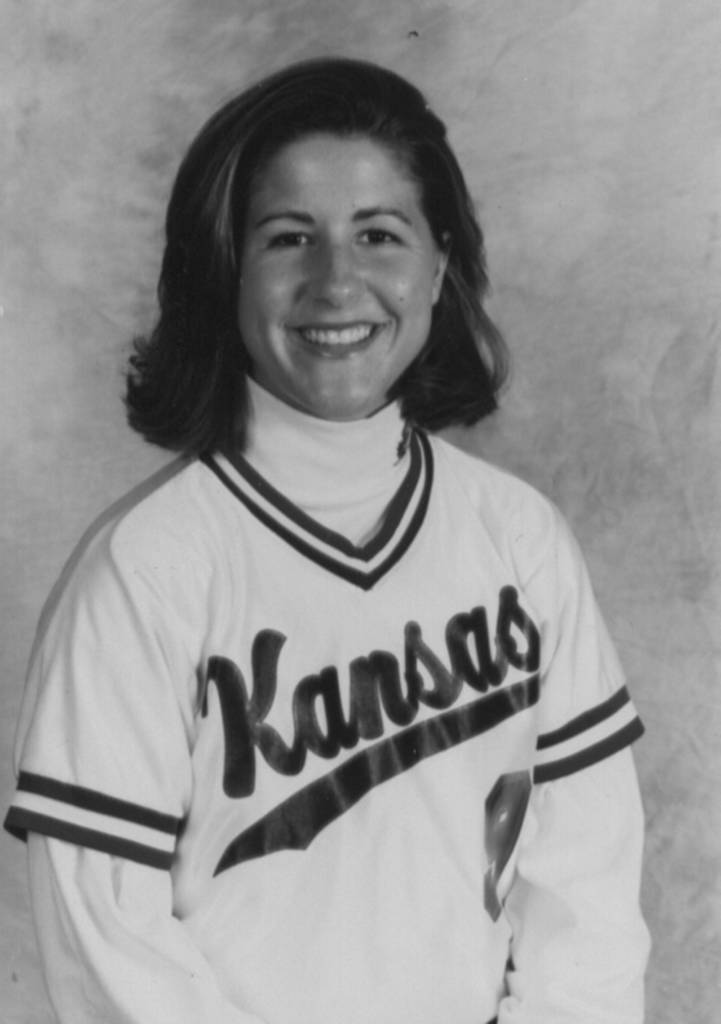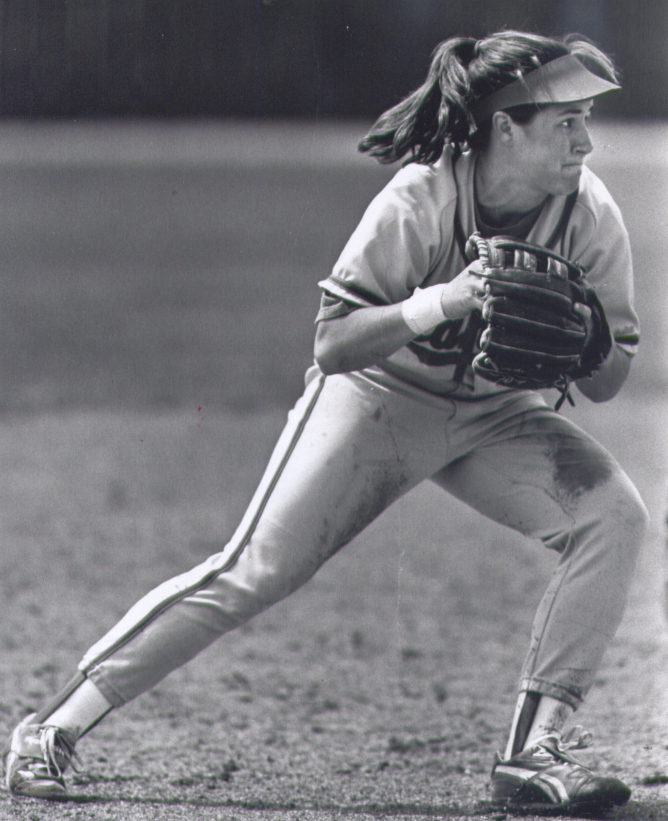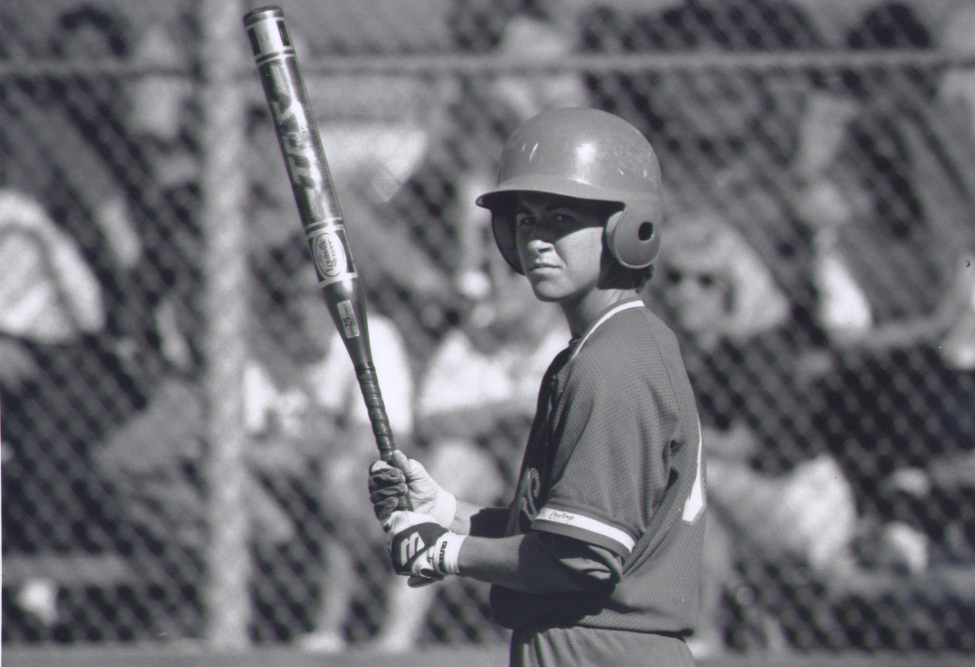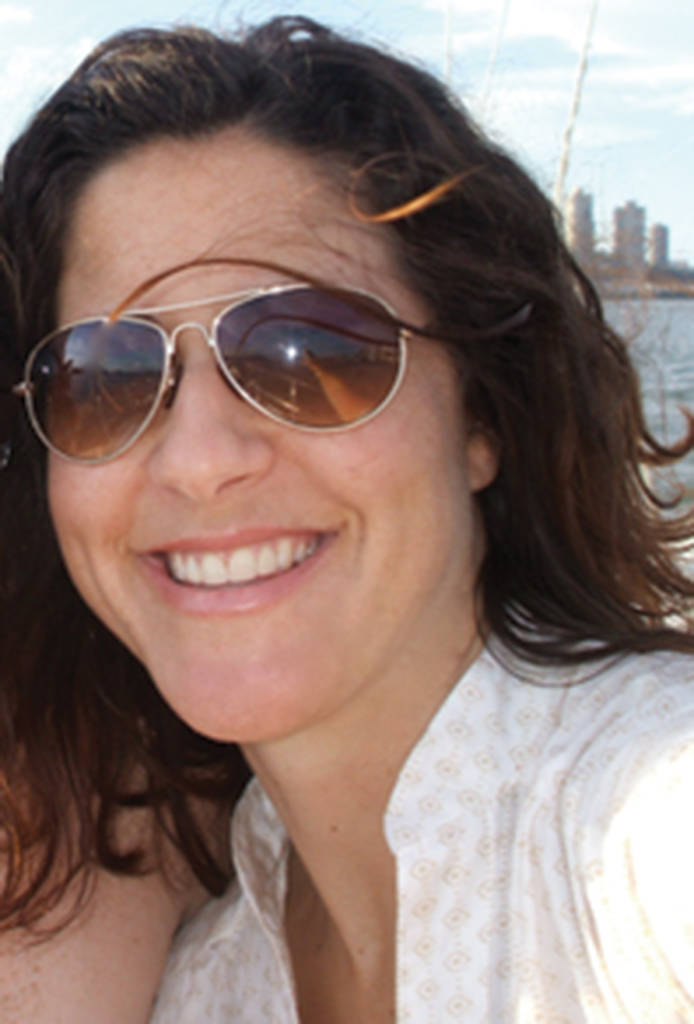Throwback Thursday: Katie Morgan
Aug. 16, 2012
 Katie Morgan (Softball) 1993-96
Katie Morgan (Softball) 1993-96
Oklahoma native Katie Morgan was named All-Big 12 First Team and Academic All-Big 12 First Team in 1996 and ranks ninth on the Kansas all-time career doubles list. Morgan has served as associate producer for the Olympics since the Winter Games in Salt Lake City in 2002, where she was awarded an Emmy for her work. She also received an Emmy in 2006 as an associate producer for Yankeeography: Graig Nettles and for the 2009 Winter Olympic Games in Beijing. Morgan currently works for Major League Baseball Productions and is the executive producer of Sunbelt Classic Productions. Morgan stopped through Lawrence after working the Kansas City All-Star Baseball Game in early July before heading to London for the 2012 Olympic Games and returning to her current home in New York City.
Growing up, how did you get interested in playing softball?
“My dad was Gordon Morgan, a famous coach at Oklahoma; a great, great man. He was a baseball coach at Tulsa University and then coached high school for many years and is in the [Oklahoma Coaches Association] Hall of Fame and all of that. I grew up in a sports-minded family. My mother was very athletic and my brother [Mark Morgan] played golf at Tulsa University. It was in my blood to be an athlete. I loved softball, my mother was my coach my entire elementary and junior high years and my father was my high school coach.”
What made you choose to play at Kansas?
“Most girls, who are talented enough and want to play in college, play in summer ball. Over the summers I had to work. I worked as a lifeguard and several different things and purchased my first car. I bought this car for $2,000 and I was so excited. My summers were completely devoted to working, so not a lot of schools got to see who I was. I was one of the best players to come out of Oklahoma that year, I was on the all-state team. The local schools wanted me Oklahoma State wanted me to play with them and Oklahoma wanted me to play with them. As far as teams from outside the area, my mother had to put together a recruiting tape. She sent out the tape to about 50 colleges and Kansas was one of them. They had just gone to the World Series the year before and they were graduating their shortstop and third baseman, both All-Americans. I had already committed to Texas and KU Coach Kalum Haack had called me and said I just got your recruiting tape and I really want you to be the starting shortstop for KU. I said well I’ve already committed. He said well why don’t you come up here, take a trip, meet the girls and make your decision.
I knew nothing about Kansas, at all. I came from a football background. We loved college football, the Sooners versus the Cowboys, and knew nothing about college basketball. As we were driving to Kansas I was telling my mom and dad, I don’t want to go here. I don’t want to be a part of this. I just want to go to Texas. And we came over the hill, and I don’t know what it is, but you see this beautiful, what looks like a palace. I was just like, oh my gosh, this is gorgeous. As soon as I got there and saw the facilities, went to Anchutz, then we went in to Allen Fieldhouse and saw all the pictures on the wall of the All-Americans and I told my mom as we were walking through the hall, my picture is going to be on this wall one these days. Then meeting the team, the team was awesome, and then I fell in love with
Kansas. I took back my commitment to Texas and decided to go to Kansas.”

What is your most memorable moment as a Jayhawk?
“My freshman year was one big moment. We were ranked in the Top 10 with a good chance to go back to the World Series. I was playing with caliber players. All-American pitcher, Stephani Williams, was unbelievable, and we rode her coattail. I remember playing one big game after another: Lisa Fernandez and UCLA, Tiffany Boyd with Cal State-Fullerton, we had a big game against Fresno who was ranked third in the nation. These moments playing as a freshman, there was a huge sense of responsibility because I didn’t want to let the seniors down, but there was this huge sense of pride that I could play and be in the starting nine.One of my most favorite moments as a Jayhawk was being in the training room because there was such this sense of pride of the athletes from all different sports. Back then, you didn’t have a separate entity for football, so football players, basketball players, soccer players and softball players, we all came in to the same training room and we were always together. When I was there, I was hanging out with Paul Pierce; Raef LeFrentz; Dana Stubblefield on football, who was the rookie-of-the-year of San Francisco 49s; track athletes, Candace [Mason Dunback], she’s part of the K-Club now, she was amazing; tennis player Abby Woods, who won the Big Eight. It was just this incredible time, when you look back at it now, I was in the company of a lot of really great athletes.”
What led you to pursuing a career in sports producing?
“I thought I wanted to coach, and it was a bittersweet moment when I graduated and became an assistant student coach with Tracy Bunge. I did that and just fell in love with it, so I said I definitely really want to continue with softball. Kalum Haack, who left Kansas and went to Alabama, offered me the grad-assistant coaching position and the opportunity to get my master’s. I thought that’s great I can go to Alabama, which was a second-year, start-up program. I was there two years and I was with the first Alabama team to go to the World Series, which was incredible, since they were a third-year program.
There was something else inside of me that I knew I wanted to do something different. I knew I wanted to do something with directing. My mom had been a professional videographer and had all this editing equipment and I remember in my off time, I would go in and edit all these movie clips together. I loved it, I would do little mini-movies, and I was just very fascinated. So in my mind, I thought I am studying education to be a teacher I could be a coach, but nope, I want to be a director in L.A. So I decided I was going to move out to L.A. What I realized was I did not know a single person. Coach Patrick Murphy at Alabama told me that the number one thing is you need to go somewhere where you have a contact. If you move out to New York, my friend Amy, who works with NBC Sports, might need a nanny. Maybe you can nanny for her and she can get you into NBC. That’s exactly what happened. I called Amy up, perfect timing, she needed a nanny. I moved out to New York with $50 in my pocket, lived with her family, and on the weekends, I started working at NBC as a runner.
At that point, you don’t really know what you’re doing with your life, you just know that what you’re doing is really cool and you don’t want to stop. Your hard work and your dedication starts making you work up the ladder, and that’s exactly what happened. Even though I thought I wanted to direct movies, really, I was creative, and I wanted that creative flow to be nourished. Following that at NBC is exactly what happened. From runner, I moved up to head scripts and with the producer, changed the scripts and made sure everything was okay with that, and from there was hired to be head of scripts at the Olympics in Salt Lake in 2002, and when I was there met somebody who worked for Major League Baseball. So I sent my resume in to Major League Baseball and started as a production assistant and moved my way up to producer and now continue to free-lance the Olympics every two years. So this was my sixth or seventh Olympics and I’ve been working with Major League Baseball for the last 11 years.”

What was your recent experience like at the 2012 London Olympic games?
“Every Olympics is different and you are always given a different set of circumstances depending on what your work flow is like. I am a producer that works for the cable part that is MSNBC, NBC Sports Network, CNBC, so I was helping daytime and primetime. The main focus, because of budget cuts, they cannot send all of their companies out to London. So I was the eyes and ears in London for people back in New York. I was in charge of five different softwares. I had two lines, I could actually push footage from London to New York within seconds and they would get it. I would send melts and camera highlights of different events. I would put together and edit packages such as cable deliver which are AT&T, Direct TV, Subway, anything that sponsors the Olympics. I was pushing interviews like if Michael Phelps came in and interviewed with Bob Costas I would push that to the proper Elvis operator so I could push that out to daytime show. I had two production assistants under me, we worked nine hours each, and so I was able to go to several events. One of the greatest moments, I got to go to Michael Phelps’ last event, his relay, where he won the gold. I got to sit in Bob Costas’ booth and the person that sat next to me was Tom Brokaw. This was a lifetime experience I got to sit with Tom Brokaw. We cheered, gave each other high fives and I listened to great stories of when he was in Sydney, when he first met the Phelps’, and how Debi Phelps, Michael’s mom, cried on his shoulder when Michael lost his first race and didn’t get the gold.
This is a lifetime experience you just don’t have, but when you are at the Olympics anything can happen. I got to interview Misty May-Treanor and saw her and Kerri [Walsh Jennings] win their third Olympic gold medal. I got to go to the track events and see [Usain] Bolt win the 100 meter; Lolo Jones, who I adore, get fourth in the hurdles. I met Destinee Hooker who is the great, adored volleyball player for the women’s USA team. It’s just really exciting stuff. It’s a lot of fun.”
How has your athletic experience affected your career?
“Like anything, when you get into TV and live TV, you get a lot of people that are not acting like themselves. It’s stressful. There’s a lot of yelling involved, and you can’t take it personally. That was one of the things (I learned from) being a college athlete and being under pressure all the time, having to be responsible and commitment coming through in a clutch situation. All of these things that happened to me in sports I have definitely drawn upon in my career in TV broadcasting. The other intangibles like being aggressive, not giving up and wanting to be challenged. Honestly, I think a lot of people in business are very excited when they see a college athlete come to them. They know what their life was like those four years and those are all of the attributes they are looking for in business.”

You have been awarded several Emmys, you’re a producer for the Olympics and the MLB. What does being a Jayhawk mean to you among all of these prestigious titles?
“The one thing that I can always draw upon, that I am very proud of and I have on my Twitter account, I am proud softball alum of Kansas and Alabama. That is the one thing, that no matter where you go, who you meet, if you tell someone that you are a Kansas alum, they look at you differently. It’s like it is an elite thing. It really, truly is. I say it all the time. I am always proud to say that I am a Jayhawk and a Kansas alum. It is very prestigious, every time I say it people always say `Rock Chalk Jayhawk’.
I was at the Olympics and I ran in to Craig Sager, a broadcaster for collegiate and professional basketball who always wears those crazy suits; sadly, he couldn’t wear those crazy suits–he had to be uniform like every other broadcaster in the Olympics. I said I am so sad you don’t look the same because you’re not wearing your crazy outfits. And I said it is so exciting watching you interview my Kansas Jayhawks. He said did you go to KU? And I said yes, I played softball there. And he said, that’s awesome, that’s so cool, I married a Jayhawk. Jayhawks are the best. And that really is true. I feel proud to say that I not only graduated from a stellar academic school, but I also played softball there. It’s a great honor to be able to say that.”

